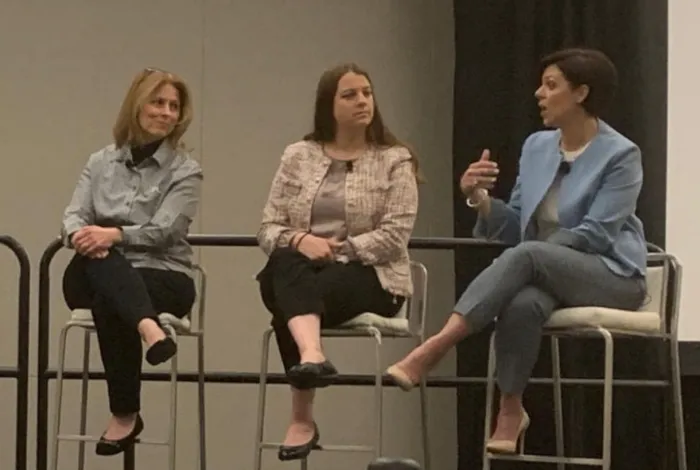

Now Available!
Get your copy of the 7th Annual State of Smart Manufacturing and hear from 300+ manufacturers in this new survey report!
Subscribe to Our Blog
For a monthly digest of expert insights, data points, and tips like the ones in this article.
Women Leaders in Manufacturing and Technology: Facing Challenges, Taking Action, and Bridging the Gap

The shortage of skilled workers in manufacturing is the biggest challenge facing the industry right now. In the U.S., some estimated two-million jobs will need to be filled in manufacturing over the next decade—and six out of 10 positions are currently unfilled.1 Women constitute one of US manufacturing’s largest pools of untapped talent; however, they still represent less than 30 percent of the manufacturing workforce.2
At PowerPlex 2019, we held the 5th Annual Women Leaders in Manufacturing and Technology luncheon and panel discussion to tackle important questions on navigating pathways to leadership, discuss strategies for mentoring, and talk about opportunities for the next generation of women in manufacturing. We had the honor of hosting an accomplished panel of women leaders and activists working to close the gender gap in the industry including Rebecca Bray, CSO of Epitec, Anna Lismore, Business Analyst for Accuride Corporation, Jennifer McIntosh, ERP Manager at Gill Industries, AJ Jorgenson, AVP Strategic Engagement of The Manufacturing Institute (the non-profit affiliate of the National Association of Manufacturers), and Karin Richner, Technical Account Manager for Plex. Robin Saitz, Plex CMO, served as the panel moderator.
Dealing with Misconceptions and Misinformation
The panel opened with a question about the challenges women face when there are so few others in the manufacturing technology space. AJ Jorgenson also cited the prevalence of misperceptions as a barrier for women entering the manufacturing industry. Many view the work as not safe or not as lucrative as other professions, which is not the reality. In fact, worker safety is the top priority of any manufacturing company in business today, and the average U.S. manufacturing worker makes about $77,506 annually.3
Jennifer McIntosh added that the other issue is the perception that women typically don’t have a passion for building assemblies or metal stamping, which is what her company, Gill Industries, does. Her solution is to put herself in situations, like the panel discussion, where she can speak excitedly about her job.
The Need for More Role Models
Introducing another challenge, Rebecca Bray discussed the lack of women role models in the industry. Women can’t see themselves in manufacturing or technology leadership jobs because there aren’t many people like them that exist today. Rebecca went on to explain that this is especially true for young women. It’s difficult for them to imagine themselves in these jobs when what they see are predominantly older men. Rebecca is on the Advisory Board for the Michigan Council for Women in Technology, and when the organization holds local events for grades K-8 they will have high school or college-aged young women come speak about science and technology. The response from young girls is often overwhelming positive because they can more easily identify with these young women.
Despite the current challenges, the panelists also offered up ways that they’re combatting the stigma of manufacturing and technology careers and getting the next generation of women excited about pursuing careers in these fields.
The Benefits of Diversity and Inclusion
Karin Richner spoke about a recent initiative to emphasize diversity and inclusion at Plex because it is a vital for innovation. Different representation and perspectives are the foundations for idea generation and simply having one homogenous group at the innovation table isn’t a good recipe for success. When under-represented groups start seeing more people they identify with, it creates a safer environment for them to speak up and share ideas.
Robin offered another way attendees can take action and brought up the concept of creating shared value. Finding volunteer opportunities that ultimately benefit customers, partners, employees and the company as a whole creates a winning outcome. Many of the women on the panel were excellent examples of this representing organizations like FIRST, The Manufacturing Institute, and the Michigan Council for Women in Technology.
Advice for Moving Forward
The panel closed with some shrewd advice for young women entering into manufacturing and technology leadership roles. Key takeaways from the panel included:
- Finding two types of mentors: a female who understands the challenges both professionally and personally and a male mentor/ally who can act as an advocate.
- Creating a support team who will be there for you—and putting yourself out there and not being afraid to get uncomfortable.
- Knowing your value and what you bring to a company, and being able to articulate that value.
- Being self-aware is the key to continual growth.
One theme was evident throughout the luncheon: when a group like this comes together thoughtfully to solve big challenges, positive results can be expected.
- Women in Manufacturing: Stepping Up to Make an Impact That Matters. Deloitte. Manufacturing Institute. APICS. 2017. http://www.themanufacturinginstitute.org/Initiatives/Women-in-Manufacturing/~/media/3B9BF94AEF0A46A5B755D17F1F1336BC.ashx
- Women in Manufacturing: Closing the Gap. AreaDevelopment. 2017.https://www.areadevelopment.com/skilled-workforce-STEM/Q3-2017/women-in-manufacturing-closing-the-talent-gap.shtml
- Parents Have Misconceptions of Manufacturing Careers. IndustryWeek. 2016. https://www.industryweek.com/workforce/parents-have-misconceptions-manufacturing-careers


